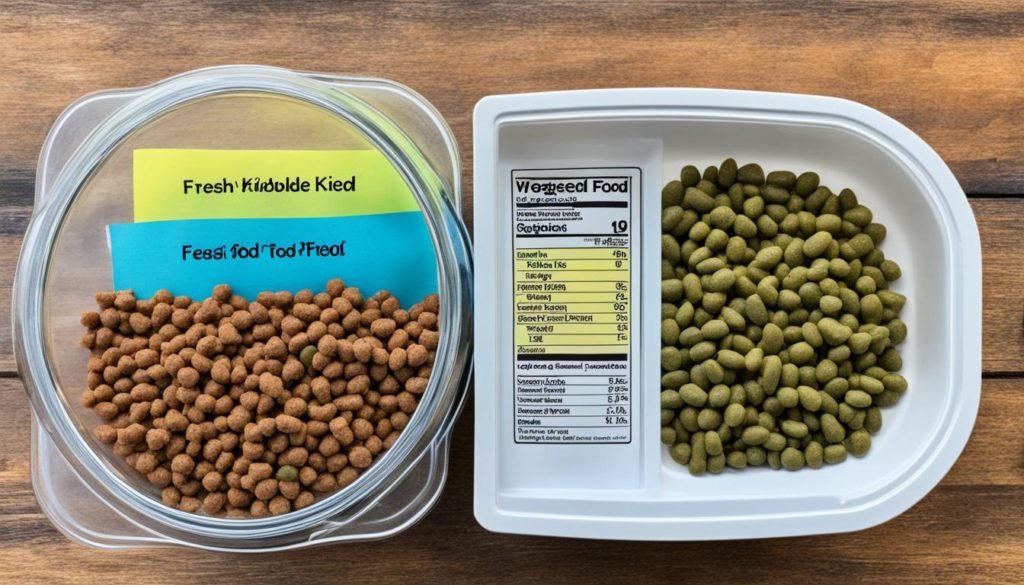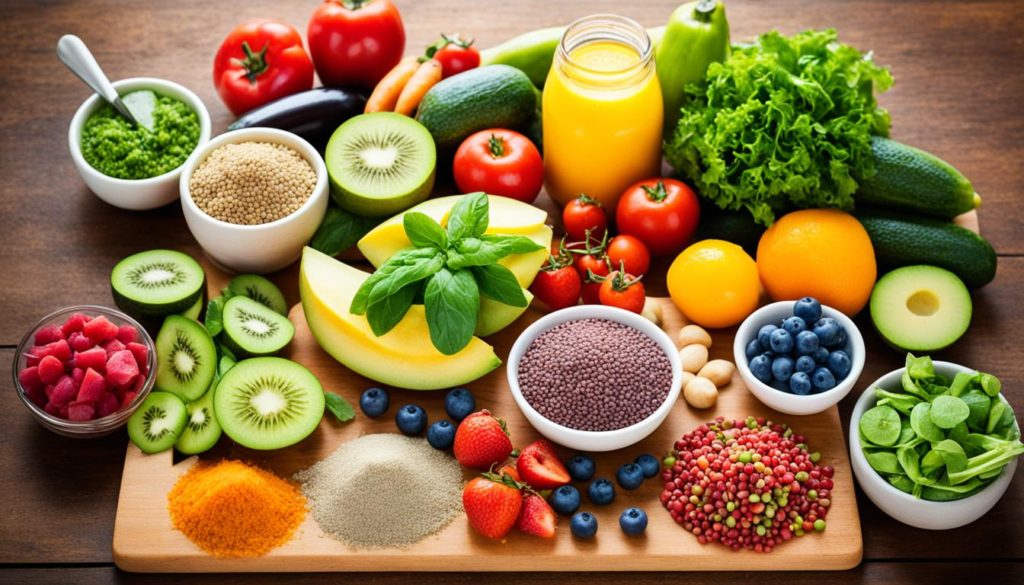Feeding your dog a nutritious and balanced diet is crucial for their overall health and well-being. While commercial dog food options are readily available, many pet owners are opting for homemade dog food to have more control over the ingredients and provide a diverse and natural diet. However, it is important to ensure that your homemade dog food diet meets all of your dog’s nutritional needs.
One way to enhance the nutritional value of homemade dog food is by incorporating supplements. Homemade dog food supplements can help to fill any nutritional gaps and promote optimal health for your furry friend. By including these supplements, you can ensure that your dog is getting the necessary nutrients to support their immune system, joint health, and overall vitality.
But what supplements are best for your homemade dog food? Let’s explore some options:
Key Takeaways:
- Feeding your dog a diverse and balanced homemade diet is important for their health.
- Supplements can help fill nutritional gaps in homemade dog food.
- Consult with a veterinarian for personalized guidance on homemade dog food supplements.
- Consider supplements like calcium, fish oil, and joint health formulas for your dog’s well-being.
- Ensure your dog’s homemade diet is complete and balanced by following nutritional guidelines.
Homemade Dog Food: Overview
Feeding a wide variety of healthy foods in appropriate proportions is sufficient for most healthy dogs. However, it is important to ensure that the homemade dog food diet is complete and balanced. This can be achieved by including a wide variety of foods from different food groups over the span of a week or two. Puppies are more susceptible to nutritional deficiencies, and large-breed puppies should be cautious of excessive calcium intake. Consulting a veterinarian is recommended for personalized guidance.
When preparing homemade dog food, it is essential to provide a diverse diet that includes a variety of foods. This ensures that your furry friend receives all the necessary nutrients to stay healthy and energetic. By incorporating different ingredients from various food groups, you can create a dog diet plan that meets their specific needs.
Here are some key points to consider when planning a homemade dog food diet:
- Variety of Foods: Include a mix of proteins, such as lean meats (e.g., chicken, turkey, beef) and plant-based sources (e.g., lentils, chickpeas, quinoa). This helps provide essential amino acids and balances the diet.
- Balance Nutritional Needs: Ensure that the diet is well-rounded by incorporating fruits, vegetables, and whole grains. This adds essential vitamins, minerals, and fiber to your dog’s diet.
- Calcium Considerations: Large-breed puppies require controlled calcium intake to prevent skeletal issues. It is vital to consult with a veterinarian to determine the appropriate calcium supplementation.
Remember, homemade dog food should be prepared with care, taking into account your dog’s specific requirements, such as age, weight, and any existing health conditions. Your veterinarian can help you create a balanced dog diet plan tailored to your furry companion’s needs. Providing a diverse diet through homemade dog food can contribute to their overall health and well-being.
Consulting a veterinarian is recommended for personalized guidance and to ensure that your homemade dog food provides all the necessary nutrients for your dog’s optimal health.
| Advantages of Homemade Dog Food | Disadvantages of Homemade Dog Food |
|---|---|
| 1. Control over ingredients and quality. | 1. Complexity in meeting specific nutritional requirements. |
| 2. Avoidance of added fillers and preservatives. | 2. Time-consuming preparation process. |
| 3. Opportunity to cater to any dietary restrictions. | 3. Cost considerations and potential higher expenses. |
Guidelines to Creating Balanced Homemade Dog Food Recipes
Creating balanced homemade dog food recipes is essential to ensure that your furry friend is getting the nutrients they need. By following these guidelines, you can provide a variety of healthy ingredients and meet their nutritional needs.
Diverse Protein Sources
Meat and other animal products should make up at least half of your dog’s diet. Including lean meats such as chicken, turkey, or beef is recommended. Raw meaty bones can be beneficial for dental health.
Nutrient-Dense Additions
Include highly nutritious additions like fish, organs, and eggs in your dog’s diet. These ingredients provide important vitamins, minerals, and essential fatty acids.
Fruits and Vegetables
Incorporate a variety of fruits and vegetables into your dog’s meals. Both starchy and non-starchy options are beneficial, providing fiber and additional nutrients. Some examples include sweet potatoes, carrots, blueberries, and spinach.
Moderate Grain and Starchy Vegetable Intake
Grains and starchy vegetables can be included in moderation. Ensure that all grains and starchy foods are well cooked to improve digestibility. Brown rice and quinoa can be suitable choices.
Consider Specific Nutritional Needs
Every dog is unique, and their nutritional needs may vary. It’s important to consult with a veterinarian or certified nutritionist to design a homemade dog food recipe that meets your dog’s specific requirements.
By following these guidelines, you can create a balanced and nutritious homemade dog food recipe for your furry companion. Remember to consult with a professional to ensure that your dog’s diet is meeting their individual needs.
Dietary Supplements for Home-Fed Dogs
While homemade dog food can provide excellent nutrition for your furry friend, it’s important to ensure that their diet is complete and balanced. This may require the addition of dietary supplements to address specific nutritional needs. Here are some key supplements to consider:
Calcium for Dogs
Calcium is an essential mineral that plays a vital role in the development and maintenance of your dog’s bones and teeth. Unless your homemade dog food includes raw meaty bones, which naturally provide calcium, supplementation is necessary. Consult with your veterinarian or certified nutritionist to determine the appropriate dosage and form of calcium for your dog.
Fish Oil for Dogs
Fish oil is a popular supplement for dogs due to its rich source of Omega-3 fatty acids. These fatty acids play a crucial role in supporting your dog’s overall health, including immune system function, brain development, and reducing inflammation. Adding fish oil to your dog’s diet can provide numerous benefits. Consult your veterinarian for the recommended dosage and type of fish oil for your dog.
Additional Supplements
Depending on your dog’s specific needs, additional supplements may be recommended. Supplements for joint health, such as glucosamine and chondroitin, can help support joint mobility and reduce the risk of arthritis. Probiotics and digestive enzymes may be beneficial for maintaining a healthy gut and improving nutrient absorption. Discuss your dog’s individual requirements with a professional to determine if these supplements are necessary.
Note: It is crucial to consult with a veterinarian or certified nutritionist before introducing any dietary supplements to your dog’s homemade food. They will evaluate your dog’s health and specific needs to provide personalized guidance and ensure the supplements are safe and effective.
By incorporating the right dietary supplements into your homemade dog food, you can help support your dog’s overall health and well-being. Remember to consult with a professional to ensure the supplements are appropriate for your dog’s needs. With the right balance of nutrition, your homemade dog food can provide optimal nourishment and contribute to a happy and healthy canine companion.

The Pros and Cons of Homemade Dog Food
When it comes to feeding your beloved canine companion, homemade dog food offers several advantages and disadvantages that you should consider. Let’s take a closer look at the pros and cons of homemade dog food.
Pros of Homemade Dog Food
- Control of Ingredients: With homemade dog food, you have complete control over the type and quality of ingredients used. You can choose to include only wholesome, natural ingredients and avoid additives, preservatives, and fillers.
- Customization: Homemade dog food allows you to tailor the diet to your dog’s specific needs. You can customize it based on factors such as age, breed, size, and any dietary restrictions or sensitivities your dog may have.
- Bonding and Satisfaction: Preparing homemade dog food can be a rewarding experience that deepens the bond between you and your furry friend. You can take pride in providing them with nutritious meals made with love.
Cons of Homemade Dog Food
- Complexity: Developing a well-balanced homemade dog food diet can be more complex than preparing food for humans. Dogs have specific nutritional requirements that may be challenging to meet consistently without proper guidance.
- Nutritional Imbalance: Without careful planning and consultation with a veterinarian or certified nutritionist, there is a risk of unintentional nutrient deficiencies or imbalances in homemade dog food.
- Time and Effort: Preparing homemade dog food requires time and effort to source, prepare, and portion ingredients correctly. It may not be feasible for busy pet owners.
- Cost Considerations: While homemade dog food can potentially save money by utilizing ingredients you already buy, it’s important to consider the overall cost. Quality commercial dog food may offer a more cost-effective option, especially when it comes to sourcing high-quality ingredients.
It’s crucial to weigh the pros and cons of homemade dog food carefully before making a decision. Remember to consult with a veterinarian or certified nutritionist to ensure that your homemade dog food meets your furry friend’s unique nutritional needs.

| Pros | Cons |
|---|---|
| Control over ingredients | Complexity of preparation |
| Customization for specific needs | Nutritional imbalance risks |
| Bonding and satisfaction | Time and effort required |
| Cost considerations |
What Supplements Are Needed for Homemade Dog Food?
When you make the switch to homemade dog food, it’s important to provide your furry friend with the necessary supplements to ensure their optimal health. Consulting with a veterinarian or certified nutritionist will help you determine the specific supplements your dog needs to thrive on a homemade diet.
Calcium supplementation is essential, especially for growing puppies. Calcium plays a vital role in supporting their bone development and overall growth. It’s crucial to ensure that your homemade dog food recipes provide adequate calcium levels. If raw meaty bones are not included in your dog’s diet, calcium supplementation becomes even more crucial.
Fish oil is another important supplement to consider for your homemade dog food. Fish oil is rich in Omega-3 fatty acids, which provide numerous benefits for your dog’s health. These fatty acids help support their immune system, promote healthy skin and coat, and reduce inflammation. Additionally, fish oil contains essential vitamins that contribute to your dog’s overall well-being.
While calcium and fish oil are two common supplements for homemade dog food, there may be other supplements that can further enhance your dog’s health. Depending on your dog’s specific needs, your veterinarian or nutritionist may recommend supplements for joint health or gut health. These additional supplements can help address specific health concerns and provide comprehensive support for your dog’s overall well-being.
Remember that the supplements your dog needs may vary depending on their individual requirements. It’s crucial to work closely with a professional to determine the appropriate supplements and dosage for your furry friend.
Supplement Recommendation Summary
| Supplement | Benefits |
|---|---|
| Calcium | Supports bone development and growth, especially important for growing puppies. |
| Fish oil | Provides Omega-3 fatty acids for immune system support, healthy skin and coat, and reduced inflammation. |
| Additional supplements | May include supplements for joint health or gut health, depending on your dog’s specific needs. |
Conclusion
Homemade dog food can be a great choice for providing optimal nutrition and promoting the overall health of your dog. By following guidelines for balanced recipes and supplementing as needed, you can ensure that your homemade dog food meets all of your dog’s nutritional requirements. However, it is important to seek personalized guidance from a veterinarian or certified nutritionist to ensure that your dog’s specific needs are being met.
When preparing homemade dog food, it is crucial to consider your dog’s dietary needs and consult with a professional to create a balanced diet plan. Homemade dog food allows you to have full control over the ingredients, ensuring that your dog receives high-quality and nutritious meals. By properly designing their diet, you can improve their well-being and support their optimal health.
Additionally, dietary supplements play a crucial role in homemade dog food. Supplements such as calcium, fish oil, and joint health formulas can help fill any nutritional gaps and support your dog’s overall health. Consult with a professional to determine the specific supplements your dog may need based on their age, breed, and individual circumstances.
In summary, when carefully planned, homemade dog food can provide your furry friend with a wholesome and nourishing diet. However, it is essential to seek advice from experts to ensure that your homemade dog food meets all of your dog’s nutritional needs and promotes their optimal health.
FAQ
What is the importance of homemade dog food supplements?
Homemade dog food supplements are important for providing optimal nutrition and ensuring your dog’s overall health. They help to fill nutrient gaps in homemade diets and address specific dietary needs.
Why is dog nutrition important when feeding homemade dog food?
Dog nutrition is crucial when feeding homemade dog food to ensure that your dog receives all the necessary nutrients for their overall health and well-being. Homemade diets should be balanced and diverse, including foods from different food groups.
What are the guidelines for creating balanced homemade dog food recipes?
Guidelines for creating balanced homemade dog food recipes include using lean meats, including organs and eggs, and incorporating a variety of fruits and vegetables. Grains and starchy vegetables should be included in moderation and well cooked.
Do homemade dog food recipes require dietary supplements?
Yes, homemade dog food recipes may require dietary supplements to ensure optimal nutrition. Calcium supplementation is necessary unless raw meaty bones are included in the diet. Fish oil and supplements for joint and gut health may also be recommended.
What are the pros and cons of homemade dog food?
The pros of homemade dog food include having control over the ingredients used and potentially saving money. However, it can be more complex and time-consuming to prepare, and it may be challenging to consistently meet your dog’s specific nutritional requirements.
What supplements are needed for homemade dog food?
For homemade dog food, calcium supplementation is essential unless raw meaty bones are included. Fish oil supplements can provide important nutrients like Omega-3 fatty acids. Supplements for joint health and gut health may also be beneficial for certain dogs.
How can homemade dog food optimize my dog’s health?
Homemade dog food, when prepared with balanced recipes and supplemented as needed, can provide optimal nutrition and promote your dog’s overall health. However, it is important to consult with a veterinarian or certified nutritionist for personalized guidance.
